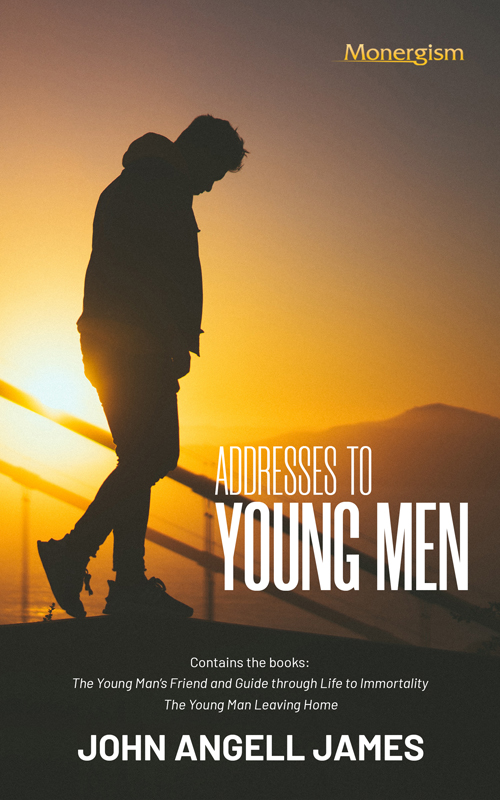 by John Angell James
by John Angell James
in ePub, .mobi & .pdf formats
My first chapter is on preparation for life. We often speak of preparation for death; and most momentous, most necessary that is—but we too much neglect to speak of preparation for life. And yet how fit is such a subject for our discourses, and your serious consideration.
The passage of Scripture placed at the head of this chapter is much in point. It is selected from a portion of Scripture which is of incalculable value, and which proves that the Bible is a book, not only to make men wise unto salvation, through faith in Jesus Christ—but to serve as a guide to them in their passage through this life, and in reference to their temporal condition—a book to form not only the saint and the devout man—but the tradesman, the parent, and the member of domestic and social life in general.
In the passage quoted above, you will at once perceive that a habit of consideration and forethought is inculcated. We must not only consider the past by looking back, or the present by looking round, but the future by looking on. All these are important.
We must look back to consider what we have done—that we should not have done; what we have not done—that we should have done; and what we have done well—that we might have done better; that thus from the past we may draw lessons for the future. It is true that in your case so short a space of life has yet elapsed, as to afford comparatively few materials for reflection, and little aid for your future guidance. But even youth has something to look back upon—and the practice of retrospection cannot be adopted too early. It is well to begin life with the formation of a habit of self-scrutiny and self-accountability.
We must also consider well the present, because there is always some duty now to be done, the doing of which is our immediate business, which no reflection on the past and no anticipation of the future, should lead us to neglect. Still, however, we must let our "eyes look straight ahead, and fix your gaze directly before us." We have not only memory, but a certain measure of foresight. True, we cannot look into futurity, so as to ascertain particular events, but we can anticipate general conditions; and it is a mark of a well-governed mind to anticipate the future as far as possible. We should consider what in all probability is to happen to us—and prepare for it. Young people are apt to look forward in a rather sentimental and romantic way—than in a practical manner; and as an exercise of the imagination—rather than of the judgment. Be thoughtful, then, and let your thoughtfulness have respect to the future. Let your eyes look straight ahead, and fix your gaze directly before you.
There is a world of practical wisdom in some single terms—among them is that momentous term, PREPARE. How many evils, in some cases, would have been avoided, had men prepared to meet them! How many benefits would have been secured, had men prepared to appropriate them! How much that they have done, would have been better done—if they had prepared to do it. How often, already, have you had regretfully to say, "I wish I had prepared for this!" Well then, let this impress you, and guide you for the future. Let your own limited experience in the little things which have yet happened, be a warning to prepare you for the greater ones which will happen.
-----
Table of Contents
PART I: THE YOUNG MAN'S FREFIN AND GUIDE THROUGH LIFE TO IMMORTALITY -- Preparation for Life
-- Entrance Upon adult life
-- Indecision as to True religion
-- Amiability without true religion
-- Perplexity occasioned by Religious controversies
-- The Character of Joseph
-- The Study of the book of Proverbs
-- Failure or Success in Business
-- Emigration
-- Disappointment or fulfillment of the hopes of parents
-- The importance of the present age
-- Death in youth, or the review of life in old age
PART II: THE YOUNG MAN LEAVING HOME
-- The Time of Leaving Home a Critical Period
-- Sources of Danger
-- The Successive Steps of Going Astray
-- Dangers of a Minor Kind
-- The Means of Safety
-- Religion a Preservative from Sin
-- Religion a Source of Comfort and Happiness
-- Religion a Means of Promoting the Temporal Interests of Its Possessor
-- Religion a Means of Usefulness
-- Religion a Preparation for Superintending a Home upon Earth, and for an Eternal Home in Heaven
-- Several Classes of Young Men Specially Addressed: Emigrants, Orphans, Religious Young Men, and Prodigals
